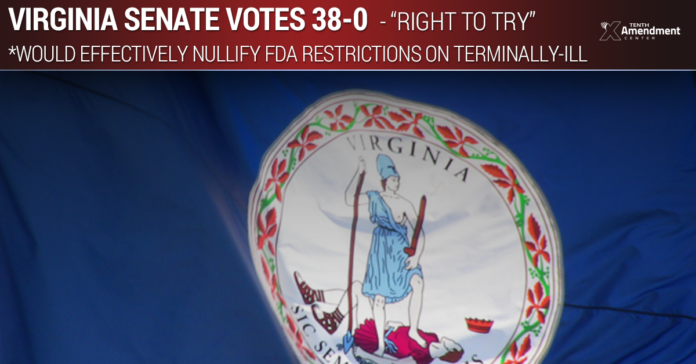 Governor Terry McAuliffe has signed the Virginia “Right To Try” Act into law. The Virginia House and Senate passed the bill in February with unanimous bipartisan support. This makes Virginia the 11th state in the country to adopt Right To Try, and the third this week. The bill was sponsored by state Delegate Margaret Ransone.
Governor Terry McAuliffe has signed the Virginia “Right To Try” Act into law. The Virginia House and Senate passed the bill in February with unanimous bipartisan support. This makes Virginia the 11th state in the country to adopt Right To Try, and the third this week. The bill was sponsored by state Delegate Margaret Ransone.
“We all know the pain of losing someone we love to a terminal illness,” said Darcy Olsen, the president of the Goldwater Institute, the group leading the national, bipartisan Right To Try effort. “If you know there’s a treatment that is helping people survive, who is anyone to say ‘No; you don’t have the right to try to save your own life or to save your child’s life’? Of course you do. Of course people should have the right to try promising medicines when they are fighting for their lives.”
Right To Try allows terminally ill Americans to try investigational treatments that have passed Phase 1 of the FDA approval process but are not yet on pharmacy shelves. Right To Try expands access to potentially life-saving treatments years before patients would normally be able to access them.
Seven-year-old Virginia resident Josh Hardy was the face of the right to try effort in Virginia. Last year, after beating cancer four times, he faced a life-threatening illness from an infection. He didn’t respond to any treatments on the market. But a drug that was going through clinical trials was showing safe, positive results for other people with similar infections. After his mother waged a social media campaign that gained international attention, the drug company agreed to let Josh try the drug and it saved his life. Josh’s story is an example of the kinds of people that will be helped by Right To Try.
Right To Try laws are already in place in Arizona, Arkansas, Colorado, Indiana, Louisiana, Michigan, Missouri, South Dakota, Utah, and Wyoming. Twenty additional states are considering the law this year. Lawmakers in Mississippi and Montana have sent similar bills to their governors for approval.
The FDA has a process that allows individual patients to ask permission to access investigational medicines, but fewer than 1,000 people a year receive help. Others die while waiting on their approval. The FDA recently announced plans to shorten the application form. “A simpler form is lipstick on a pig, window dressing for an inhumane system that prevents the vast majority of Americans with terminal illnesses from accessing promising investigational treatments. Compassionate use should be the rule for everyone, not the exception,” said Olsen.
The New York Times and Wall Street Journal have both editorialized that the Right To Try movement is prompting long overdue change at the FDA.
Right To Try is limited to patients with a terminal disease that have exhausted all conventional treatment options and cannot enroll in a clinical trial. All medications available under the law must have successfully completed basic safety testing and be part of the FDA’s on-going approval process.

